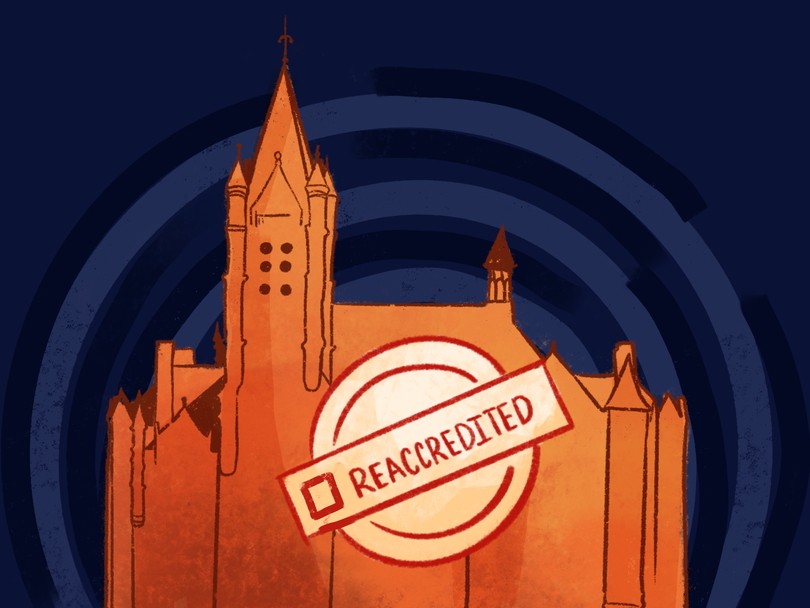Working toward Middle States reaccreditation, SU completes ‘self-study’ design

Syracuse University is within the Middle States Commission on Higher Education’s reaccreditation process. According to a release, the university completed its first “self-study” design as it works to ensure compliance with academic standards. Hannah Mesa I Illustration Editor
Get the latest Syracuse news delivered right to your inbox.
Subscribe to our newsletter here.
As Syracuse University continues to seek reaccreditation from the Middle States Commission on Higher Education, faculty, staff and students are working on the “self-study” reports section, according to a release.
The reaccreditation process involves several evaluations to confirm the university is complying with higher education standards. SU is currently in the “self-study portion,” where university administrators create a plan and self-analysis after dialogue with stakeholders.
In early 2025, the“self-study design,” a document developed by SU to serve as a guide for the entire self-study process, was completed. It has since been approved by MSCHE, according to the release.
Since September 2025, working groups consisting of over 140 faculty, staff and students have been reviewing materials from the Office of Institutional Effectiveness to complete their reports, according to the release.
These draft reports will then be compiled into a “draft self-study report,” which will be available to the campus community in Fall 2026.
The reaccreditation process is overseen by Julie Hasenwinkel, co-chair of the steering committee and associate provost for academic programs. She said this is an opportunity to reflect as an institution.
“It’s not just about compliance; it’s about institutional improvement,” Hasenwinkel said in the release. “The process gives us a structured framework to examine our strengths and identify areas where we can do even better.”
Next year, an open comment period will begin, allowing feedback from the campus community to be part of the finalized report.
A final version will be sent to MSCHE in December 2026. Peer evaluators from other institutions will visit the university in March 2027 to review the report and meet with “key” campus leaders, making their final determination by June 2027.
In April, President Donald Trump signed an executive order prohibiting the “unlawful discrimination and ideological overreach” of the previous accreditation process. It stated accreditation institutions were enforcing “discriminatory” DEIA standards which violated federal law.
Over the summer, SU erased mentions of diversity, equity, inclusion and accessibility from its shared competencies, six institutional learning goals. The university said it’s doing so to comply with MSCHE’s accreditation process.
“These competencies are part of the university’s obligations under MSCHE accreditation and reflect ongoing alignment with accreditation standards,” a university spokesperson told The Daily Orange in October. “The University has a duty to ensure compliance with our accreditor body’s expectations.”
MSCHE is one of 19 college and university accreditation agencies recognized by the United States Department of Education, responsible for assessing institutions throughout the country.
To earn accreditation, SU will need to satisfy MSCHE’s seven key standards: mission and goals; ethics and integrity; design and delivery of the student learning experience; support of the student experience; educational effectiveness assessment; planning, resources and institutional improvement; and governance, leadership and administration.
Higher education institutions must be accredited for students to receive federal grants and loans, according to the Council of Regional Accrediting Commissions. Only accredited institutions are eligible to receive and distribute federal financial aid to students.
Additionally, in order to transfer credits between universities, students must be coming from accredited institutions.
University accreditation enhances a school’s reputation for potential employers, licensing boards and other colleges, according to the Higher Learning Commission. Employer-paid tuition reimbursement programs often require enrollment in an accredited institution.
“Accreditation provides current and potential students assurance that they are receiving a quality education,” its website states.
The university was most recently reaccredited in 2018 and must conduct a self-study every 8 years to retain its MSCHE accreditation, which it has done since 1910.





